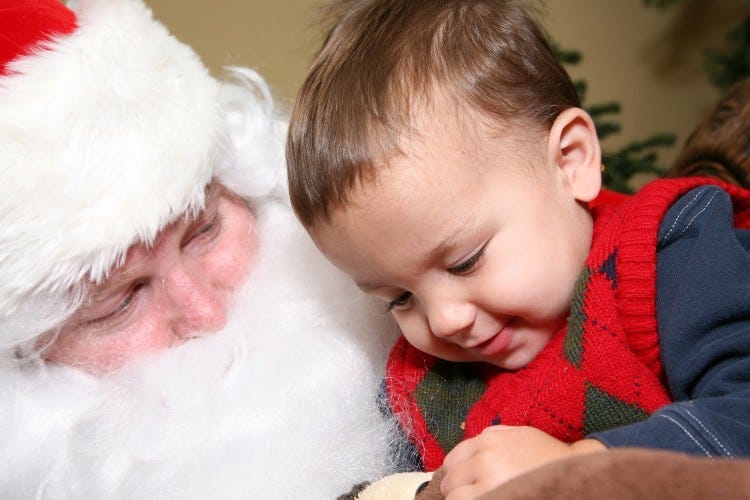Should I Lie To My Son About Santa?
Or should I find other ways to scar him forever?
Trying something new today! This is a free guest post by Jeff Maurer of I Might Be Wrong. If you like my work, you’ll absolutely love his. He’s hilarious, online-but-normal, and overall just extremely talented (he’s also written for Last Week Tonight with John Oliver.) I’ve collaborated with Jeff to write opposing articles on the debate of whether you should lie to your kids about Santa (I am pro-lying.) You can read my free pro-lying-about-Santa article (published this morning) over on his Substack, which again, I highly recommend!

Let me start by saying: I don’t think you can “scar” your child by lying to them about Santa. If the Santa myth left kids psychologically shattered, then it would have done so to about 80 percent of present-day American adults, myself included. But we were not warped by that; we were warped by other things, namely junior high gym uniforms, Old Yeller, and the disconcerting sexiness of the fairies in Zelda: The Ocarina of Time.
My son is almost two: By next Christmas, his language skills will be good enough that my wife and I will need to have settled on a Santa strategy. We’re definitely doing Santa; we already paid Nordstrom $50 for six pictures of our son looking like a hostage as he tried to wiggle off of Santa’s lap (not pictured above — that’s a stock photo of a kid knocking the Santa interaction out of the park). But when our son starts asking questions, will we tell him that Santa is real? On the one hand, lying could degrade trust; on the other hand, rigid insistence on the truth could stifle his imagination. My wife and I have a responsibility to think this through; after all, we want to be able to eventually tell his therapist “Well we tried to not fuck everything up.”
Santa, of course, is a central figure in the Christian Holy Trinity Of Getting Your Kids To Chill Out And Behave, along with the Easter Bunny and the Tooth Fairy. The real-life Saint Nicholas was a fourth century Turkish bishop who gave women dowries to save them from prostitution, though that history has been lost – no parent today tells their child “Santa brought you a Nintendo Switch so that you don’t have to become a prostitute!” Over the years, the myth synthesized several characters, including Father Christmas (England), Sinterklaas (Netherlands), and – I’m not making this up – Joulupukki the Finnish Yule Goat. We eventually decided that Santa is a jolly elf who brings toys and not a hellish goat-headed half-man who forages for leftover Christmas food (again: real!). Though I do wonder if we made the right choice. My son’s a picky eater; he might change his tune if he thought that cleaning his plate was the only way to keep a nightmarish goat man from kicking down our door and raiding the fridge.
The modern conception of Santa is pure fun. And my wife and I want to milk the jolly old elf for all the mirth that he’s worth, because we’re not inherently whimsical people. My background is in economics, hers is in neuroscience — we worry that our instinct is to present the world as the joyless product of a rational if indifferent universe. And we don’t want to turn the boy into a black turtleneck wearing nihilist; when his preschool teacher sings “Twinkle Twinkle Little Star,” we don’t want him to yell “The star cannot be ‘up’ — that presumes a Geocentric view of the universe!” There needs to be room for whimsy and make-believe, and only when he’s a bit older will we reveal that everything he held dear was a towering mountain of bullshit.
So, is playing along with the Santa myth part of that? Maybe. But I worry that it runs counter to something important that we want him to learn, which is that Mom and Dad don’t lie. And we don’t – if the downside of having two half Vulcan weirdos as parents is that we treat fun as a cultural artifact to be grudgingly tolerated, the upside is that what we say is trustworthy. We want our son to see us as reliable sources of information, which seems especially important now that social media has caused brain-dead bullshit to achieve critical mass. If pretending that Santa is real lessens our son’s trust in us even a small amount, then it might not be worth it.
But, ultimately, we’ll probably opt out of lying about Santa not because we think it’s harmful, but because we think it’s unnecessary. After all, our goals are: 1) To let the boy experience joy and wonder instead of locking him in a Skinner box and forcing him to do math worksheets until he’s admitted to MIT, and 2) To not lie. And we don’t think lying is necessary to achieve goal #1. Because, sure: A tale of a magical elf who flys around the world and commits some playful breaking and entering is a great story. But so is the fact that humans produced that story. Santa is a product of a cultural history that’s interesting as hell; we can certainly do stockings and cookies and all the fun stuff, but instead of presenting it as the literal truth, we can present it as the strange-but-true fact that we’re participating in a centuries-old tradition that combines Turkish bishops with Finnish goat-men.
Which would also be a bit of subtle pushback against cultural doomerism. It’s common these days to encounter people who think that bringing children into the world is an act of cruelty. My wife and I think that’s dead wrong, and our first two years of parenthood seem to validate that premise – kids are awesome, the boy loves us and we love him, the haters can fuck straight off. And at the risk of getting all Steven Pinker on you, we also think there’s never been a better time to be alive. My wife and I aren’t afraid of what our son might encounter; we’re excited about what he’ll experience. We think the objective reality is that the world is full of complex and astounding things, many of which remain a mystery. Phrased another way: We’re already up to our asses in wonderment, and tall tales of a gift-giving elf are not required.
My son already enjoys our Little Golden Book version of ‘Twas the Night Before Christmas – he likes to point at the reindeer and say “doggy” (we’re not filling out that MIT application just yet). By next Christmas, he’ll probably have the language skills to ask: “Is that a true story?” And I might say: “Well it is true that it’s a story.” Which is a line from No Country For Old Men – that movie is just one of the incredible things my son has to look forward to! His life will be full of fun and remarkable things, and we don’t need to lie about a flying, philanthropic imp to convince him of that.






The most important collaboration of our time
People agonize so much over this. The solution is simple: when kids ask if Santa is real, just don’t tell them. Answer, “What do you think?” If they insist to know what dad thinks, just say, “I’m not going to tell you what I think — I want you to figure it out for yourself.”